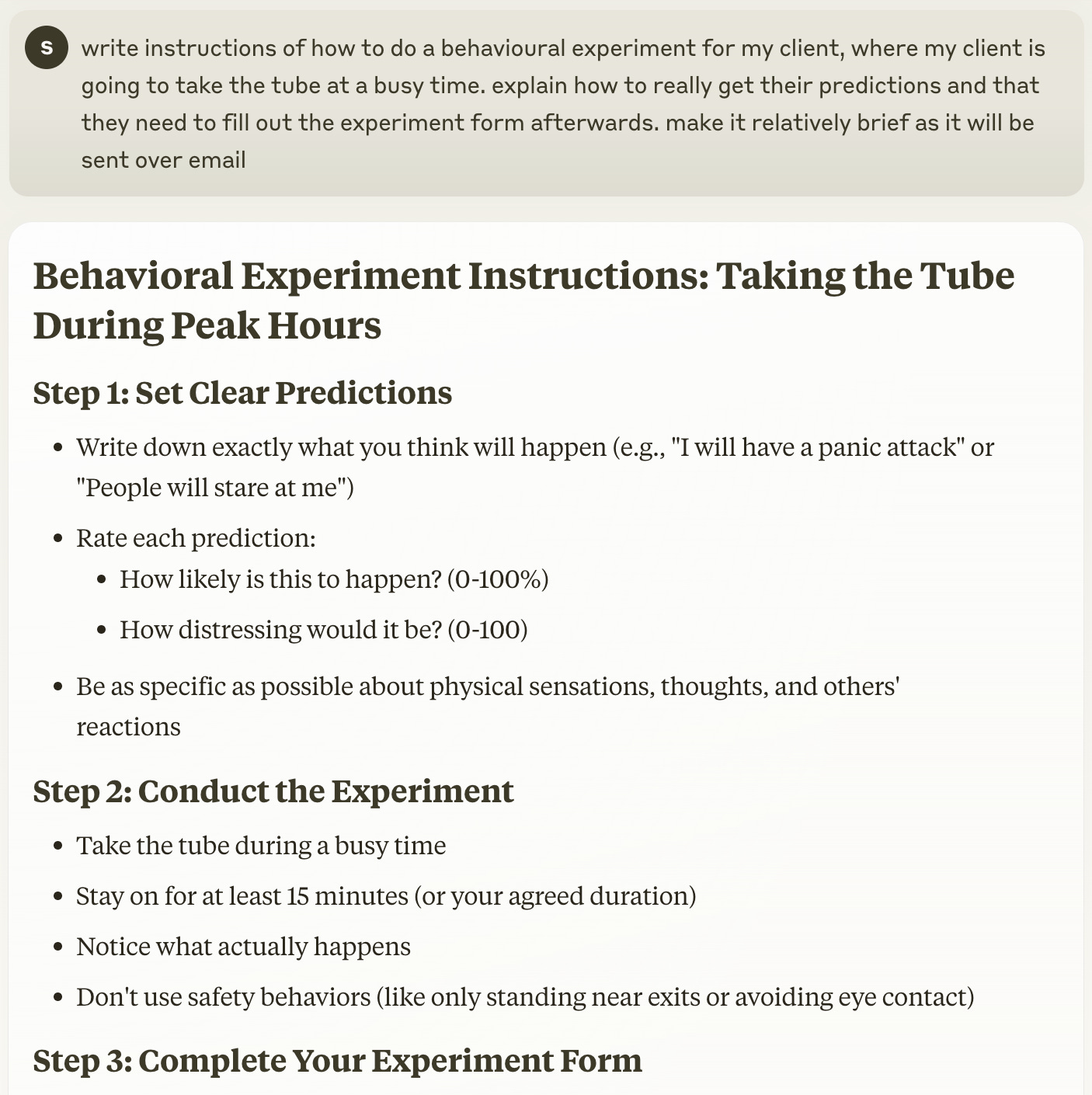AI and Your CBT Practice: Work Smarter, Not Harder By Integrating AI in Day-To-Day Tasks
Discover how AI tools can transform your administrative burden into productive time with clients while enhancing your marketing reach—all without compromising ethics.
As CBT therapists, when it comes to running our private practices, many of us struggle with the business side of things—particularly the time-consuming tasks that pull us away from direct client care.
Artificial intelligence (AI) tools have evolved significantly in recent years, offering therapists powerful ways to streamline administrative work, enhance marketing efforts, and even supplement clinical resources. In this article, we explore practical applications of AI that can help you grow your CBT practice while maintaining your focus on what matters most: helping your clients.
Streamline Your Admin: Create Templates and Communication and Stop Spending Hours on Admin Tasks
Client Communication Templates
AI excels at creating customisable templates for routine communications:
Intake paperwork explanations
Appointment reminders
Homework instruction sheets and emails
These templates can maintain your voice while saving you valuable time. For example, you might create a template for explaining a homework task, which you can then quickly customise for each client's specific situation.

Clinical Documentation
While AI should never replace your clinical judgment in documentation, it can help streamline the process:
It can create note frameworks that follow evidence-based CBT session structures
Referral letter templates for different specialties and services
Discharge letters templates and basic communication templates
But what about actually having to write notes? This is where we enter the realm of issues of confidentiality and ethics as AI would be directly involved with the client.
HeidiHealth is a GDPR compliant AI that listens in on sessions and writes summary notes and more. Whilst this is helpful, whether clients would be comfortable with this, and us as clinicians, is a different question altogether and one that requires deep thought and discussion.
Website Content and SEO: Staying Relevant and Discoverable
Regular Blog Updates
Consistently publishing relevant content on your website is one way to improve search engine visibility (AKA how likely you are to come up on Google when someone searches for your skillset) and demonstrates your expertise. However, many therapists struggle to find time for regular writing.
AI can help by:
Generating content outlines based on CBT-related topics you want to cover
Expanding bullet points into full-featured articles
Suggesting relevant keywords to improve search-ability
Refreshing outdated content with current research and approaches
For example, you might prompt an AI with: "Create an outline for a blog post about using CBT techniques for world politics related anxiety, incorporating the latest research." From there, you can refine the outline and ask the AI to draft sections, which you'll then review and personalise with your clinical voice and expertise.
Remember that AI-generated content should always be:
Reviewed for accuracy - it can often make things up!
Infused with your unique clinical perspective
Checked for ethical alignment with your professional standards
SEO Optimisation
Beyond creating content, AI can help optimise your website's visibility:
Meta description generation that incorporates relevant keywords
Title tag optimisation to improve click-through rates
Content analysis to ensure readability and appropriate keyword density
Details of the SEO workshop are on our events page here:
Clinical Resources and Support
Worksheet Development
CBT, as we are sure you know, relies heavily on worksheets and handouts. AI can help you:
Create customised thought records for specific presenting problems
Develop specialised exposure hierarchies for various anxiety disorders
Design behavioural activation worksheets tailored to client interests
For example, you have some general psycho-education worksheets about anxiety, but you want it to be tailored specifically for relationship anxiety. You may ask the AI ‘Read this worksheet (upload the worksheet), and keep it the same, other than changing all the examples from general anxiety to specific relationship anxiety related fears and examples’. Afterwards, you will be left with a psychoeducational guide that speaks directly to your client.
Ethical Considerations and Best Practices
While AI offers huge benefits for your practice, it's important to maintain appropriate boundaries:
Always maintain clinical judgment
AI should support—never replace—your professional expertise, supervision and clinical decision-making.
Ensure client confidentiality
Never input protected health information into public AI tools that don't have GPDR compliance. If you do wish to use GDPR compliant tools such as Heidi, it is worth exploring the ethics and nuances of this first with your accrediting body, as well as your clients.
Maintain transparency
Be honest with clients about how and where you use AI in your practice.
Review everything
Always review and modify AI-generated content before using it with clients or publishing it.
Getting Started: A Simple Implementation Plan
If you're new to using AI in your practice, start small and see what you feel comfortable with.
AI offers us the opportunity to reduce administrative burden, enhance our marketing efforts, and focus more of our energy on what matters most: providing exceptional care to our clients.
By thoughtfully incorporating AI into your practice management, you can create more time for direct client care while building a more visible and efficient practice.
The key is maintaining your clinical judgment and personal touch while leveraging these powerful tools to handle the routine tasks that often drain your time and energy.
Remember: AI is a tool in your therapeutic toolkit—not a replacement for your expertise, empathy, and clinical judgment. Use it wisely to enhance, rather than replace, the human connection that remains at the heart of effective therapy and always ensure you are not giving AI confidential and private information.





